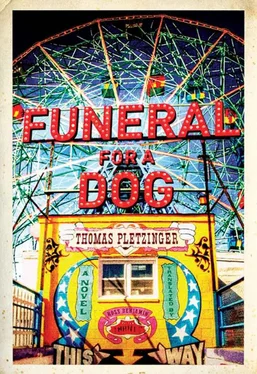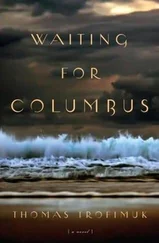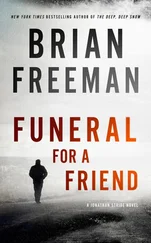against the fox
Svensson leads us around the property. A small blue car with open driver’s-side door is parked at the edge of the woods (FIAT 128 Sport L), covered in ivy and moss. Standing on the Fiat are two bored roosters (brown, white). Svensson introduces them: This is William Wordsworth, he says, and here we have Robby Naish. Under the oleander another chicken is pecking around in the wilted flowers on the ground. Daisy Duck, says Svensson, the hen. The white rooster crows, the boy laughs: cock-a-doodle-doo. Tuuli kneels next to him and, shaking her head, watches Svensson scatter seeds in the Fiat and slam the door. For a home, says Svensson, you need seventy-seven chairs, three chickens and a dog to guard against the fox.
Heiligengeistfeld
At first we didn’t recognize each other. Because her hair was long and the T-shirt with the British flag long since discarded, five years later Elisabeth and I again worked for months in the same building without talking to each other (I never managed to find the T-shirt). Then it was she who rammed her tray into my back in the Gruner + Jahr cafeteria at noon and didn’t apologize until early evening in the Baumwall U-Bahn station. She recited the prescribed salutation of the market and opinion polling company: Hello-my-name-is, I’m-calling-on-behalf-of, jogging my memory (her voice sings resistance to pieces). We talked about this and that, such as the port (the launches and cruise ships), her editorial department ( Brigitte culture section) and my freelance work ( GEOkompakt ). Elisabeth seemed glad to see me, but when I asked her how long it had been since our sad interlude in market research (Esso, Wal-Mart), her child must already be five by now, between St. Pauli and Heiligengeistfeld Elisabeth suddenly said that she had to get off here, here was her home (she actually said: here is my home!), even though she’d previously mentioned the Generals’ Quarter.
Yoko Mono
Elisabeth is a sober woman. She steered me through that evening and through the things that had to be clarified, places of residence, visions, and finally bodies. The whole time she looked me in the eyes (her voice a taxi). I’d jumped off the train behind her, and then she’d taken me along to a bar on Markt-strasse (Yoko Mono). She ordered wine, Barbera, she called out, with her right hand she bunched up her hair and tucked it behind her ears. I’d already gotten used to her face. When I quoted from an old book after the third glass (red hair, red hair, I tear it out, make a broom to fly about), she looked at me, lifted her glass to her mouth, and I noticed for the first time her swallow and her delicate neck. She undid one of her hairpins and took a calculable risk as she quoted the saying “rusty roof, damp cellar.” Several blocks farther, she nonetheless said goodbye to me for now without a touch (at the corner of Bismarckstrasse and Scheideweg, of all places). We could see each other tomorrow afternoon in the cafeteria, she said.
little porno face
During the first few weeks, Elisabeth and I often saw each other in the cafeteria (the unpopular tables facing the courtyard) and quickly began to live off each other (her personal affairs and my personal affairs fused into one big affair). Elisabeth is a smart woman. The first time we slept together I was surprised by her porno face (her mouth an O, occasionally she bit her lips) and the speed with which she fucked me (that’s how she talked, that’s how it was), she by my soundlessness. She said: We don’t fit. But we did fit after all. We met in the evening in bars we didn’t know, we discussed how we could be (we imagined ourselves). As other people introduce their friends, we announced our bodies. She wanted: to be free when fucking. I wanted body and mind to be in step. Elisabeth said: some pain is natural. I said: theoretically. She said: exactly. She could come harder when she was squatting and had a finger lightly touching her asshole (words fail me). I said I like to watch women masturbate. That same week both of us suddenly got new job offers: I was given a regular freelance position at GEO , she became an editor (her still-husband would not have been uninvolved in that, but at that point she hadn’t mentioned him yet). Our theory gave way to my euphoria. I’d already pictured her various faces beforehand (a vein on her forehead during sex as if she were carrying heavy suitcases). Your little porno face, said Elisabeth, as I came with less restraint than I was used to.
Santuario di Nostra Signora della Caravina
Now Svensson’s talking. He explains the mountains: over there Monte dei Pizzoni, he says, and gestures upward at the shores to the right and left, here Monte Cecchi. Svensson throws pinecone after pinecone into the lake. He explains the villages: San Mamete on the opposite shore, Osteno over there behind the trees, Porlezza at the end of the lake. Svensson points to the opposite shore: Cima di Porlezza. Over there, under a rough, jagged mountain, is a village, in the middle of it a church is glowing yellow. Svensson says: Santuario di Nostra Signora della Caravina (a sleeping gecko, the left foreleg a rockslide). Below the church a grand villa (same yellow, in front of it palms, a dock with white posts). The boy examines the shattered monitor. At night the church tower is illuminated and looks like a gladiator, Svensson tells him, do you know what a gladiator is? But the boy looks up from the shards and asks,
Why does your dog have only three legs?
My notebook is still in the shopping bag as even the dog suddenly falls silent and looks at Svensson full of anticipation. Where the fourth leg of the dog is would have been one of my questions too. It took us an hour to cross the murkily reflective lake (long before the shore mosquitoes already swarming over the water), and now I’m sitting next to the small, pretty mother on a stone bench under the oleander (white and red flowers). She’s smoking again. I’m here for my interview, and I have to go back to the city today (Lido Seegarten). I’ll offer her one of my cigarettes. Well, Svensson begins, then he looks at the small woman and falters, he doesn’t answer the question (the dog motionless as a photo, the fourth leg airbrushed out). The boy walks slowly toward his mother. Tuuli moves over and is suddenly close to me, she laughs smoke into my ear, don’t write this, Manteli , she says, Svensson’s stories are made up (I would only have to turn my head toward her).
Why does your dog have only three legs?
Lua was a professional night watchdog, he says in reply to the boy’s almost-forgotten question, he wears the moon over his heart. Svensson lays his hand on the dog’s black fur (dark gray from up close). I found him at full moon on the roadside, a car had hit him, he was lying in a pool of blood, right over there near the church. Svensson points to the other side of the lake. German shepherds are good night watchdogs. I brought him to the hospital in San Mamete, his leg had to be amputated, for a few weeks he couldn’t move. Lua is a sad dog. Svensson goes back to the boat. The boy approaches the sad dog carefully and lifts his hand (hesitation). Svensson looks at Tuuli and says: but after some time dogs get used to any loss. Lua flops heavily on his side, over the shore lies a light mist, there’s a smell of something burning. The boy withdraws his hand and asks, is Lua dangerous? Tuuli’s reply: the dog is old, he’s going to die soon.
Interview (first try)
MANDELKERN: Could you explain to me again what exactly I shouldn’t write, Ms….
TUULI: Call me Tuuli, Karvasmanteli , you can drop the formality, we’re the same age.
M: I was born in 1972.
T: Exactly. You’re in your early thirties and so are we. More or less. Svensson seems older and I younger. Right?
Читать дальше












